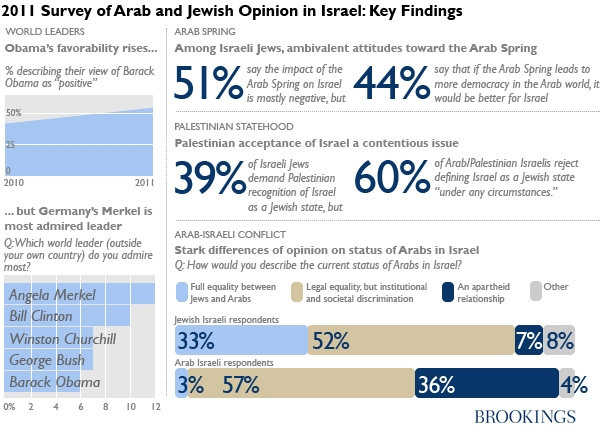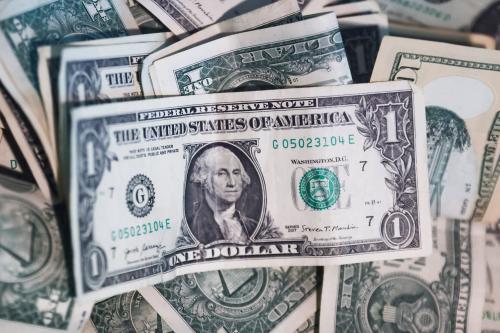On Thursday, December 1, Shibley Telhami, Anwar Sadat Professor for Peace and Development at the University of Maryland and nonresident senior fellow at the Saban Center for Middle East Policy at Brookings, released the 2011 Public Opinion Poll of Jewish and Arab Citizens of Israel, produced in conjunction with Zogby International.
The poll surveyed 1,010 people in living in Israel in November 2011, assessing prospects for Arab-Israeli peace, attitudes toward the United States and the Obama administration, the impact of the Arab awakening, and opinions on where the Middle East is headed politically.
Get audio, video and a transcript from the launch event »

Key Findings: Poll Results Among Jewish Israelis
Attitudes toward the United States
- In contrast with 2010, when majorities of Israeli Jews expressed unfavorable views of President Obama, a majority (54%) of Israeli Jews polled in 2011 expressed a favorable view of the U.S. President while 39% expressed negative views.
- Overall strong majority of Israeli Jews, 80%, continue to have a favorable view of the United States. Still, 39% are discourage by the Obama Administration’s policy in the Middle East, 22% are encouraged, while 35% are neither discouraged nor encouraged.
- Israelis Jews identify policies toward the Arab-Israeli conflict as the number one issue in assessing American foreign policy, followed by aid to Israel, and thirdly policy toward Iran.
- 29% of Israeli Jews feel that the policies of the Netanyahu government are negative for Israeli-American relations, while 23% believe it is positive, and 45% believe they make no difference.
The Arab Awakening
- 46% of Jewish Israelis polled say that the Arab spring is mostly about ordinary people seeking dignity, freedom, and better life, while 34% believe it is about opposition parties or sects seeking power, and 12% feel it is about foreign powers trying to stir trouble in the region.
- 51% of Israeli Jews polled feel that the Arab Spring has been mostly negative for Israel. However, if the Arab Spring in fact lead to more democracy in the Arab world, a plurality of Israelis, 44%, feel it would be better for Israel, while 22% feel it would be worse.
Iran
- Israeli Jews are equally divided on attacking Iranian nuclear facilities, with 43% supporting and 41% opposing an attack. However, 68% of Arab citizens of Israel, who constitute nearly 20% of the population, oppose such an attack, while only 4% support it (see below). Overall, more Israelis oppose than support an attack.
- Given a choice of two options, one where both Israel and Iran have nuclear weapons and one where neither has them, 65% of Israeli Jews support the latter while only 19% support the former.
- 90% of Israelis believe that Iran will eventually develop nuclear weapons.
- By a ratio of two to one, Israelis support an agreement that would make the Middle East a nuclear weapon free zone, including Iran and Israel, with a system of full inspections of all facilities where nuclear components are built or stored.
- 53% of Israeli Jews identify themselves as Jewish first, while 37% identify themselves as Israeli first. Yet, only one quarter of Israelis feel that the Jewish character of Israel is more important than its democracy while another quarter believe that democracy is more important and about feel both are equally important.
The Arab Israeli Conflict
- Most Israeli Jews want the Palestinians to recognize Israel as a Jewish state, but only 39% insist that this be done as precondition for negotiations or settlement freeze while 40% would accept it as part of a final settlement.
- 49% of Israeli Jews say that peace with the Palestinians will never happen, while 42% say it will happen but will take more than five years.
- 43% support a comprehensive peace based on the 1967 borders, while 31% oppose withdrawing from territories occupied in 1967 even if all Arab states accept and recognize Israel. 24% choose nether option.
- A robust majority of Israeli Jews, 71% support a formulation of Israel that accommodates its non-Jewish citizens by defining the state as “the homeland of the Jewish people and of all its citizens.”
- Two thirds of Israeli Jews say that Israel should do more to promote a comprehensive peace based on the 1967 borders with agreed modifications and a peaceful Palestinian state.
- 52% of Jewish Israelis believe that Arab citizens of Israel have legal equality but institutional and societal discrimination, while 33% say there is full equality between Arab and Jewish citizens.
Global Perceptions
- In an open question, more Israeli Jews (12%) identify German leader Angela Merkel as the most admired leader in the world followed by former U.S. President Bill Clinton with 10%. Israeli Jews identify Iranian President Mahmoud Ahmadinejad as by far the most disliked leader (36%).
Key Findings: Poll Results Among Palestinian and Arab Israelis
Iran
- 47% of Arab/Palestinian Israelis believe that Iran is developing nuclear weapons while 38% say its nuclear program is peaceful. 48% say that a nuclear Iran would be negative for the Middle East, while 17% say it would be positive.
- 53% of Arab/Palestinian Israelis say Iran has the right to its program and should not be pressured, while 32% say it should be pressured to stop it.
- 68% of Arab/Palestinian Israelis oppose an attack on Iran’s nuclear facilities, while 4% support such an attack.
Israel
- 60% of Arab/Palestinian Israelis reject defining Israel as a Jewish state “under any circumstances” while 31% accept it if a Palestinian state is established and Arab citizens of Israel are given full rights.
- 57% described the current status in Israel as one of legal equality but of institutional and societal discrimination, 36% describe it as akin to apartheid, and 3% say there is full equality.
Arab Awakening
- 45% of Arab/Palestinian Israelis say the United States has played the most constructive role in the Arab awakening, followed by Turkey (32%) and France (29%).
- 44% say the international intervention in Libya was a mistake while 35% say it was the right thing to do.
- The overwhelming majority of Arab/Palestinian Israelis (three quarters or more) support the rebels over governments in Syria, Bahrain, and Yemen.
- 50% are more optimistic about the future of the Arab world in light of the Arab Spring, while 19% are more pessimistic.
- 33% of Arab/Palestinian Israelis would like to see the next President of Egypt look like Turkish Prime Minister Erdogan, 16% like Mandela, and 10% like Obama.
The Brookings Institution is committed to quality, independence, and impact.
We are supported by a diverse array of funders. In line with our values and policies, each Brookings publication represents the sole views of its author(s).




